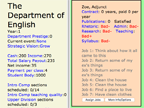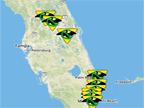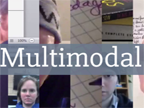Open Issue
21.2 Spring 2017
Logging On
- In This Issue, In The World - Cheryl Ball, Editor
-
Disputatio
-
How I Learned to Love DESPAIR: Using Simulation Video Games for Advocacy and Change
Way Jeng

Inspired by games such as the various Tycoon titles, DESPAIR (Department of English Simulated Problematic Adjunct Instructor Relations) puts players in the role of a Writing Program Administrator (WPA) in order to shed light on the plight of contingent labor in the writing classroom and within the larger institutional framework. The game's alternate mode, UPLIFT (Utopian Potential for Life with Instructors at Full Time), provides an example of a way academics might use simulation games to advocate for change in an affirmative manner by demonstrating how alternatives might work.
-
-
Topoi
-
Visualizing Obama Hope: A Data Visualization Project for Mapping Visual Rhetorics
Laurie Gries

Digital visualization techniques offer rich possibilities for visual rhetoric and circulation studies. This webtext applies visualization techniques to 1000 various forms of the Shepard Fairey Obama Hope image to reveals wide and diverse circulation and modification beyond its original political purposes, demonstrating how such methods can help rhetoricians better account for the transnational flows, circulation, and rhetorical applications of viral images through iconographic tracking.
-
A Feminist Approach to Social Media
Alexandra Hidalgo & Katie Grimes

In this webtext, Hidalgo and Grimes respond to Kristine Blair’s call to make online spaces more hospitable to women’s social professional and political goals by developing six social media guidelines rooted in feminism. They argue that feminism provides key insights on how to create online communication styles that foster positive and productive interactions.
-
The Deepwater Horizon Roadkill Tollbooth
Sean Morey

""The Roadkill Tollbooth is a MEmorial, and focuses on public policy issues concerning domestic oil production and consumption through a digital, conceptual, and affective mapping of the Deepwater Horizon oil spill, offering an alternative to how we communicate our individual and collective responses to such a disaster.""
-
-
Praxis
-
On Multimodal Composing
Sara P. Alvarez, Michael Baumann, Michelle Day, Khirsten L. Echols, Layne M. P. Gordon, Ashanka Kumari, Laura Sceniak Matravers, Jessica Newman, Amy McCleese Nichols, Caitlin E. Ray, Jon Udelson, Rick Wysocki, & Dànielle DeVoss

What does composing look like in and across digital, networked spaces and the physical spaces our bodies inhabit as we compose? What does multimodal composing look like as we choreograph alphabetic text, images, sound, video, and more? In this project, the authors take on these questions as they capture and share their composing processes across mediums, platforms, localities, and languages.
-
-
PraxisWiki
-
Using ELAN Video Coding Software to Visualize the Rhetorics of Translation
Laura Gonzales
-
Using Evernote to Encourage and Monitor Student Research
Steve Marsden
-
Critical Exploration of Learning Management Systems
A. Nicole Pfannenstiel, Tenie Zarifian, & Jordan Watson
-
3D Interviewing with Researcher POV Video: Bodies and Knowledge in the Making
Ann Shivers-McNair
-
KairosCast
-
KairosCast Episode 8: Lauren Neefe & Cydney Alexis
KairosCast Episode 9: Karl Stolley
Courtney Danforth & Harley Ferris
Interviews
Reviews
-
CCCC 2016 Reviews
Andrea Beaudin, Cheryl Ball, James Jarrett, Michael J. Faris, Eds.
-
A Review of Still Life With Rhetoric: A New Materialist Approach for Visual Rhetorics by Laurie Gries
Angelia Giannone
-
Her Story: A video game by Sam Barlow
Alisha Karabinus & Bianca Batti
-
Index: All Kairos Reviews

